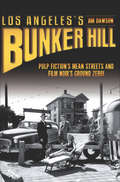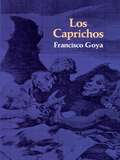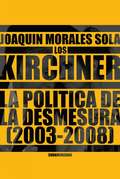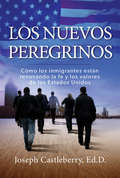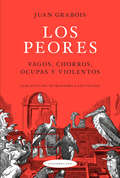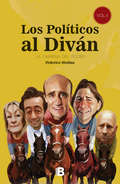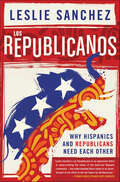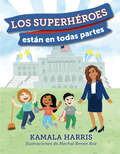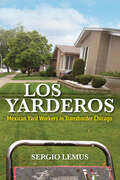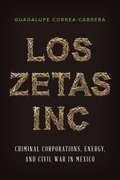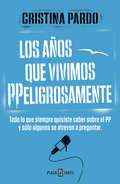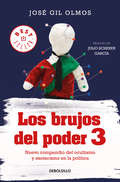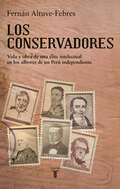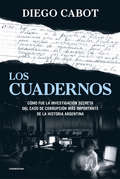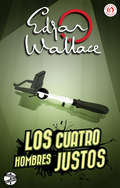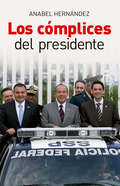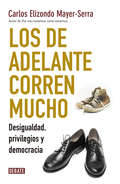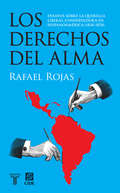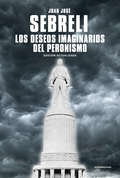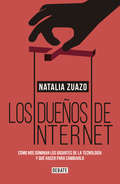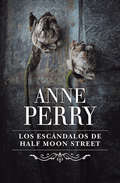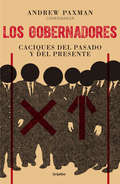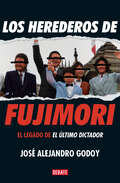- Table View
- List View
Los Angeles and the Summer Olympic Games: Planning Legacies (SpringerBriefs in Geography)
by Eva Kassens NoorThis open access book describes the three planning approaches and legacy impacts for the Olympic Games in one locale: the city of Los Angeles, USA. The author critically compares the similarities and differences of the LA Olympics by reviewing the 1932 and 1984 Olympics and by analyzing the concurrent planning process for the 2028 Olympics. The author unravels the conditions that make (or do not make) LA28’s argument “we have staged the Games before, we can do it again” compelling. Setting the bid’s promises into the contemporary local and global mega-event contexts, the author analyzes why LA won the bids, how those wins allowed LA to negotiate concessions with the IOC and NOC, and how legacies were planned, executed, and ultimately evolved. The author concludes with a prediction which 2028 legacy promises might and might not be fulfilled given the local and international Olympic contexts.
Los Angeles's Bunker Hill: Pulp Fiction's Mean Streets and Film Noir's Ground Zero!
by Jim DawsonAn illustrated history of the iconic Hollywood neighborhood featured in numerous film noir classics—and the shadowy story of how it disappeared. When postwar movie directors went looking for a gritty location to shoot their psychological crime thrillers, they found Bunker Hill, a neighborhood of fading Victorians, flophouses, tough bars, stairways, and dark alleys in downtown Los Angeles. Novelist Raymond Chandler had already used its real-life mean streets to lend authenticity to his hardboiled detective stories featuring Philip Marlowe. But the biggest crime of all was going on behind the scenes, run by the city&’s power elite. And Hollywood just happened to capture it on film. Using nearly eighty photos, writer Jim Dawson sheds new light on Los Angeles history with this grassroots investigation of a vanished place.
Los Caprichos
by Francisco GoyaAfter a serious illness in 1792, Goya spent five years recuperating and preparing himself for the burst of creativity that was to follow. He read deeply in the French revolutionary philosophers. From Rousseau he evolved the idea that imagination divorced from reason produces monsters, but that coupled with reason "it is the mother of the arts and the source of their wonders." In Spain he saw a country that had abandoned reason, and he peopled Los Caprichos with the grotesque monsters that result from such an action. Plate after plate shows witches, asses, devils, and other strange creatures, many of which are caricatures of members of the society against which Goya was fighting. The plates were first published in 1799. There are still in existence, however, six extremely rare sets of artist's proofs, considered by most who have managed to see them as infinitely superior to the work actually published. Now, for the first time, this edition reproduces one of these sets of 80 prints, together with the "Prado" manuscript, a commentary on the plates. In addition, this collection contains supplementary material to the Los Caprichos series, inlcuding a never-before-published study for Caprichos 10; three unique proofs of plates probably intended for publication with the others; a preliminary drawing for plate I, a self-portrait of Goya (which appears as the frontispiece to this volume); and a unique proof of "Woman in Prison" which may represent an earlier version of Caprichos 32.
Los Kirchner: La política de la desmesura 2003-2008
by Joaquín Morales SoláUna selección de las mejores columnas del autor en el diario La Naciónsobre el gobierno de los Kirchner. Cada una de sus columnas fue una crónica a la vez que un análisis lúcidoacerca del proceso político que permitió transformar a un hombre votadopor apenas el 22% de los argentinos en un fenómeno de concentración depoder pocas veces visto en la breve historia democrática argentina. Peromás allá de la crónica y el análisis, Morales Solá supo ver -para enojodel matrimonio Kirchner, que muchas veces usó los atriles paracriticarlo- cómo aquel poder hegemónico iba dejando fisurasinstitucionales, heridas políticas, problemas económicos irresueltos,curiosas interpretaciones históricas que degradarían con mayor rapidezque la que fue necesaria para construir el sistema creado por lapareja gobernante.Este libro se lee como un ensayo en tiempo presente y como un drama envarios actos. Cada columna seleccionada por Bartolomé de Vedia parecehaber sido escrita ayer mismo. Los personajes principales son siemprelos mismos, los secundarios entran y salen de la escena.
Los Nuevos Peregrinos: Como Los Inmigrantes Estan Renovando la Fe y los Valores de los Estados Unidos
by Ed. D. Joseph CastleberryPerfectly timed to address the strategic immigration debate that is a major focus of the 24/7 news cycle now and will continue even beyond the 2016 presidential election.
Los Peores: Vagos, chorros, ocupas y violentos. Alegatos del humanismo cascoteado
by Juan GraboisProvocativo y visceral, este libro confronta el estereotipo de los pobres movilizados como colectivo de vagos, ocupas y violentos manipulados por gerentes de la pobreza que lucran con la desesperación, sin evadir una cruda mirada introspectiva sobre los aspectos oscuros de un proceso social cuyo rumbo está en disputa. Cuenta la leyenda negra que los movimientos sociales son un colectivo de vagos, ocupas y violentos manipulados por gerentes de la pobreza. Esta prédica vernácula no solo proviene de voces que gozan de mucha influencia en la sociedad, sino también de la gente común. ¿Qué hay detrás del estereotipo más declamado de la Argentina? ¿Realmente los excluidos no trabajan? ¿Por qué el poder real invierte tiempo y recursos en demonizarlos? ¿Alcanza la economía popular para llevar una vida digna? ¿Es verdad que la mitad del país mantiene a la otra mitad? Sin romantizar a los movimientos populares ni evadir las contradicciones de todo proceso vivo, con vigorosa eficacia y un enfoque de carácter ético, en este libro de alegatos el referente social Juan Grabois deconstruye el mito de Los Peores y responde los ataques mediáticos de sus detractores: "Nosotros, Los Peores, tenemos un plan. No me refiero al plan estilo 'plan trabajar', de esos tenemos más o menos 1,2 millones... Digo que tenemos un plan magistral para nuestra propia extinción". Una historia de entrega y compromiso, de errores y desvíos, de conquistas y derrotas, que revela la compleja trama de la economía popular organizada y la militancia social como alternativa a la exclusión y el descarte.
Los Políticos al Diván. Volumen II: La carrera al poder
by Federico MedinaEl psicólogo Federico Medina vuelve a trabajar con humor sobre los perfiles psicológicos de los políticos más relevantes de la escena nacional. En esta entrega se sentaran en el diván: Daniel Martínez, Luis Lacalle Pou, Jorge Larrañaga, Juan Sartori, Edgardo Novick, Carolina Cosse y algunos emergentes. En los Políticos al diván volumen II, Federico Medina da rienda suelta a su propia locura, y a partir de sus manías y obsesiones, invita al lector a un paseo vertiginoso por las cabezas y los deseos de les candidates a presidente de esta zafra 2019. En en el marco de un Uruguay electoral y febril de múltiples tiempos, este tour analítico recorre sus biografías, y se detiene en sus promesas, conflictos, traumas sin resolver, miedos, vestimentas, trucos, y torpezas, en una aventura tan delirante como cercana, donde se cruzan las más variadas figuras de nuestra farándula política. Por el diván de este libro pasan los principales candidatos de esta nueva carrera electoral: Daniel Martínez, Luis Lacalle Pou, Carolina Cosse, Juan Sartori, Edgardo Novick, Jorge Larrañaga y un pelotón de aspirantes a figurar en la política nacional o solo en estas páginas. Con conceptos propios del psicoanálisis, y con mucho humor sin palabrotas el autor se instala en un consultorio imaginario y presenta en cada capítulo una suerte de diagnóstico final, que no deja afuera sus aspectos sanos y los detalles más llamativos de las personalidades de estos personajes de idéntica aspiración.
Los Políticos al Diván. Volumen II: La carrera al poder
by Federico MedinaEl psicólogo Federico Medina vuelve a trabajar con humor sobre los perfiles psicológicos de los políticos más relevantes de la escena nacional. En esta entrega se sentaran en el diván: Daniel Martínez, Luis Lacalle Pou, Jorge Larrañaga, Juan Sartori, Edgardo Novick, Carolina Cosse y algunos emergentes. En los Políticos al diván volumen II, Federico Medina da rienda suelta a su propia locura, y a partir de sus manías y obsesiones, invita al lector a un paseo vertiginoso por las cabezas y los deseos de les candidates a presidente de esta zafra 2019. En en el marco de un Uruguay electoral y febril de múltiples tiempos, este tour analítico recorre sus biografías, y se detiene en sus promesas, conflictos, traumas sin resolver, miedos, vestimentas, trucos, y torpezas, en una aventura tan delirante como cercana, donde se cruzan las más variadas figuras de nuestra farándula política. Por el diván de este libro pasan los principales candidatos de esta nueva carrera electoral: Daniel Martínez, Luis Lacalle Pou, Carolina Cosse, Juan Sartori, Edgardo Novick, Jorge Larrañaga y un pelotón de aspirantes a figurar en la política nacional o solo en estas páginas. Con conceptos propios del psicoanálisis, y con mucho humor sin palabrotas el autor se instala en un consultorio imaginario y presenta en cada capítulo una suerte de diagnóstico final, que no deja afuera sus aspectos sanos y los detalles más llamativos de las personalidades de estos personajes de idéntica aspiración.
Los Republicanos: Why Hispanics and Republicans Need Each Other
by Leslie SanchezHispanics comprise one of America's largest business-minded, faith-based, culturally-conservative entities—and their numbers continue to grow. Long assumed to be aligned with the Democrats, Hispanics have been ignored by many Republicans. Noted Hispanic marketing expert and political commentator Leslie Sanchez passionately argues that Hispanics, after years of watching Democrats fail them, need to shift their bets to Los Republicanos or risk gambling away their political future. In her book, Sanchez debunks the cultural and political myths about Hispanics and Republicans alike. She also offers a look at today's changing Hispanic mindset and the new dynamic force that is rising.
Los Superhéroes están en Todas Partes
by Kamala HarrisAntes de que Kamala Harris se convirtiera en abogada, senadora y vicepresidenta de Estados Unidos, fue una niña a la que le encantaban los superhéroes. Y cuando los buscaba a su alrededor, ¡se sorprendía al encontrarlos en todas partes! Los había en su familia, entre sus amigos, incluso en su misma calle; los superhéroes estaban dondequiera que ella miraba. Y esos superhéroes le enseñaron que todo lo que se necesita para ser un superhéroe es dar lo mejor de ti. En esta motivadora y expresiva memoria, que va directa al corazón de los niños, Kamala Harris lleva a los lectores a través de su vida, y les muestra que el poder para lograr un mundo mejor está dentro de cada uno de nosotros.
Los Yarderos: Mexican Yard Workers in Transborder Chicago (Latinos in Chicago and Midwest)
by Sergio LemusMigrants from the Mexican states of Zacatecas, Guanajuato, Jalisco, and Michoacán have become an important presence in Chicago and the Midwest. Many hold jobs as yarderos gardening, caring for lawns, and doing other landscaping work. Sergio Lemus explores the lives of these migrants and looks at the struggles they face as they work to make the city their home. Drawing on fieldwork in South Chicago, Lemus tells the stories of first and second-generation yarderos and discusses the historical, economic, cultural, and political ramifications they face as they acquire their working-class identity. Lemus’s compassionate portrait places them within America’s ongoing tradition as a nation of immigrants while analyzing their place within today’s transborder cultural moment. Perceptive and humane, Los Yarderos reveals how a group of Mexican immigrants navigates the crossings of the borders that divide class, color hierarchies, gender, and belonging.
Los Zetas Inc: Criminal Corporations, Energy, and Civil War in Mexico
by Guadalupe Correa-CabreraThe rapid growth of organized crime in Mexico and the government's response to it have driven an unprecedented rise in violence and impelled major structural economic changes, including the recent passage of energy reform. Los Zetas Inc. asserts that these phenomena are a direct and intended result of the emergence of the brutal Zetas criminal organization in the Mexican border state of Tamaulipas. Going beyond previous studies of the group as a drug trafficking organization, Guadalupe Correa-Cabrera builds a convincing case that the Zetas and similar organizations effectively constitute transnational corporations with business practices that include the trafficking of crude oil, natural gas, and gasoline; migrant and weapons smuggling; kidnapping for ransom; and video and music piracy. <P><P> Combining vivid interview commentary with in-depth analysis of organized crime as a transnational and corporate phenomenon, Los Zetas Inc. proposes a new theoretical framework for understanding the emerging face, new structure, and economic implications of organized crime in Mexico. Correa-Cabrera delineates the Zetas establishment, structure, and forms of operation, along with the reactions to this new model of criminality by the state and other lawbreaking, foreign, and corporate actors. Since the Zetas share some characteristics with legal transnational businesses that operate in the energy and private security industries, she also compares this criminal corporation with ExxonMobil, Halliburton, and Blackwater (renamed “Academi” and now a Constellis company). Asserting that the elevated level of violence between the Zetas and the Mexican state resembles a civil war, Correa-Cabrera identifies the beneficiaries of this war, including arms-producing companies, the international banking system, the US border economy, the US border security/military-industrial complex, and corporate capital, especially international oil and gas companies.
Los años que vivimos PPeligrosamente: Todo lo que siempre quisiste saber sobre el PP y solo algunos se atreven a preguntar
by Cristina PardoUna crónica fresca, ácida, divertida e inteligente de la trastienda política de los últimos años. ¿Cuántas versiones regionales existen del himno del PP? Y ¿cuántas puede escuchar un ser humano y mantenerse cuerdo? ¿Es inconveniente servir chorizos en mitad de un escándalo de corrupción? ¿Existe alguien que sepa qué es una indemnización en diferido en forma de simulación? ¿Cuántas veces puede cambiar de opinión un ministro? ¿Cuánta tensión puede soportar el cuerpo humano durante una rueda de prensa? ¿Contiene el diccionario suficientes sinónimos para evitar la palabra «rescate»? ¿Puede el Gobierno terminar la legislatura sin recortar el capote de la Virgen del Rocío? Los años que vivimos PPeligrosamente es una crónica fresca, ácida, divertida e inteligente de la trastienda política reciente. Un periodo austero, sobre todo en buenas noticias, en el que necesitamos más que nunca lalabor de periodistas como Cristina Pardo, capaces de contar, y a veces traducir, lo que sucede a nuestro alrededor. Observación periodística, ingenio y denuncia en un libro que habla abiertamente de política sin dramatizar, y sin perder nunca la sonrisa.
Los brujos del poder 3: Nuevo compendio del ocultismo y esoterismo en la política (Los brujos del poder #Volumen 3)
by José Gil OlmosLa relación entre políticos y brujos se remonta hasta el origen mismo de diversas sociedades alrededor del mundo. México no es una excepción y, tal como documenta José Gil Olmos, la serie de gobernantes proclives al susurro de la magia es larga. Las razones originales han cambiado desde el tiempo de reyes y reinas, emperadores, dictadores y señores feudales, pero incluso hoy los presidentes, gobernadores, mandos militares y hasta políticos menores acuden a pedir ayuda y protección a brujos, espíritus y chamanes. Figuras como Evo Morales, Hugo Chávez, Enrique Peña Nieto o Andrés Manuel López Obrador no sólo ambicionan ver el futuro, sino que aspiran a eliminar a sus oponentes o a volverse intocables durante su ejercicio público del poder. No desean ser legitimados, porque eso lo hace la democracia: quieren ser invencibles bajo el manto de lo sobrenatural. Prólogo de Julio Scherer García
Los conservadores: Vida y obra de una élite intelectual en los albores de un Perú inpendiente
by Fernán Altuve-FebresLos conservadores tiene su origen en una inquietante pregunta que atañe a la historia política en el Perú ¿Hemos sido capaces de crear un pensamieno conservador? Hace dos siglos, en los inicios del Perú independiente, más que un pensamiento conservador orgánico, surgieron exponentes intelectuales que sostenían, entre otras ideas, la fidelidad a la monarquía hispánica. Con la Independencia surge el debate entre la alternativa monárquica o republicana como la forma de gobierno más adecuada para el nuevo Estado. ¿Qué beneficios y desafíos conllevaba para el Perú una monarquía moderada o una confederación con Bolivia? ¿De qué modo la élie y la iglesia fortalecieron sus alianzas para preservar el poder? El reconocido abogado y académico Fernán Altuve-Febres da cuenta en este ensayo de algunos de los precursores de esta modalidad del pensamiento nacional. Aplicando el método biográfico-intelectual, y centrándose en el contexto histórico que abarca esde el ocaso del Reino del Perú (1809) hasta la consolidación definitiva de la República (1839), el autor aborda la vida y obra de Blas de Ostolaza, José Ignacio Moreno, José de la Riva-Agüero, José María de Pando, Juan García del Río, Antonio José de Irisarri y José Joaquín de Mora, quienes sientan las bases de la corriente conservadora en el Perú.
Los cuadernos: Cómo fue la investigación secreta del caso de corrupción más importante de la historia argentina
by Diego CabotCómo se hizo la investigación periodística que develó cómo el kirchnerismo recaudaba millones de dólares de empresarios corruptos para financiar su aparato político y enriquecer funcionarios. 902 páginas10 años de recaudación ilegal43 compañías involucradas112 funcionarios y empresarios mencionados36.000 millones de dólares en efectivoLa trama secreta del caso de corrupción más importante de la historia argentina El 1 de febrero de 2005, Oscar Centeno empezó a escribir un diario de sus tareas como chofer de Roberto Baratta, el principal recaudador de dinero negro del kirchnerismo. Página a página aparecen funcionarios, empresarios y miembros del círculo gubernamental, hoteles y domicilios adónde se retiraban paquetes enormes de billetes. Desde los pedidos de helado para el ministro Julio De Vido -la cabeza del sistema recaudador al servicio de Néstor Kirchner- hasta las facturas de los bolsos para transportar sobornos millonarios que se dejaban en la Casa Rosada, la Residencia de Olivos y el edificio del matrimonio presidencial. Una década después, Centeno había completado 8 cuadernos y un anotador. Cuando llegaron a sus manos, Diego Cabot se dedicó a chequear uno a uno los datos que allí se consignaban. Meses más tarde, esa pesquisa minuciosa y secreta se transformó en la primicia más espectacular de la historia y dio pie a la mayor causa anticorrupción de la que se tenga memoria en el país. En Los Cuadernos, Cabot revela al fin toda la verdad de una investigación sin precedentes que generó cientos de especulaciones, operaciones y contra operaciones, arrepentidos, denuncias, encarcelamientos y traiciones y que cambió para siempre la forma de hacer política en la Argentina.
Los cuatro hombres justos
by Edgar WallaceA sir Philip Ramon le trae sin cuidado la carta firmada por cuatro hombres que se autoproclaman "justos". El ministro de Relaciones Exteriores no dará el brazo a torcer en la presentación del proyecto de ley que regula la extradición de extranjeros.Toda la policía de Londres está al acecho, las medidas de seguridad son máximas, el ministro se encierra en una habitación inexpugnable.Aun así, un extraño dispositivo y un flash de magnesio--que bien pudo ser nitroglicerina--dejan desconcertada a Scotland Yard.Ni siquiera la perspicaz prensa británica puede encontrar una pista que lleve a Manfred, Gonsalez, Pioccart y Thery, los cuatro hombres justos.Edgar Wallace dejó este misterio sin solución y prometió una recompensa a los lectores que la encontraran.El desafío sigue en pie.
Los cómplices del presidente
by Anabel HernándezLos cómplices del presidente contiene la denuncia más consistente y documentada que se ha hecho hasta ahora sobre corrupción e impunidad durante el presente sexenio. Los cómplices del presidente fue publicado originalmente a fines de 2008. Van más de 40 000 ejemplares vendidos desde entonces. En la nota a esta nueva edición en Debolsillo, la autora escribe: Han pasado un año y tres meses desde la aparición de Los cómplices del presidente. En este corto periodo el libro ha adquirido gran importancia y demanda una nueva lectura, incluso para mí como autora. Hoy más que nunca sus líneas se vuelven vigentes para comprender la convulsa época que vivimos. En septiembre de 2008, cuando le puse punto final a esta obra, tuve la certeza de que ninguno de los tres protagonistas, Felipe Calderón, Juan Camilo Mouriño y Genaro García Luna terminaría bien el sexenio. El tiempo me ha dado la razón. La muerte de Juan Camilo Mouriño lo convirtió en mártir y no en el político que debía rendir cuentas por sus abusos y excesos (aquí documentados). Calderón vive su propio infierno. Hoy García Luna es señalado públicamente por políticos de oposición como corrupto. Por todo esto, el libro permite entender lo que está sucediendo en nuestro país.
Los de adelante corren mucho: Desigualdad, privilegios y democracia
by Carlos Elizondo Mayer-Serra¿Por qué América es la región más desigual del mundo? ¿Qué explica esta injusta realidad? Todos somos iguales, ¿pero por qué algunos son más iguales que otros? En México -y de hecho en todo el continente americano- la desigualdad ha permitido a unos pocos miles de hombres (rara vez son mujeres) dominar las decisiones políticas y económicas. Las élites han modelado la historia para asegurarse el poder, el dinero y, con frecuencia, la impunidad. Hay momentos históricos en los que cambian las élites. La desigualdad permanece. ¿Cómo se conforman las clases dominantes y qué principios las rigen? ¿Cuáles son sus contradicciones? ¿Por qué se pelean y de qué modo se intercambian favores? ¿Cuándo se les imponen límites y cómo se relacionan con el resto de la sociedad? El examen profundo de las oligarquías exige poner bajo la lupa la idea misma de igualdad, para descubrir que es un concepto más problemático de lo que parece a primera vista. Definirla ya es un reto; determinar sus alcances, una labor con hondas implicaciones éticas y políticas. Esta obra acepta el desafío y explica por qué los de adelante corren mucho, y los de atrás...
Los derechos del alma. Ensayos sobre la querella liberal-conservadora en Hispanoamérica (1830-1870): Ensayos sobre la querella liberal-conservadora en Hispanoamérica (1830-1870)
by Rafael RojasLa guerra armada en las nacientes repúblicas hispanoamericanas tuvo su paralelo en el mundo de las ideas. Ésta es su historia.Este libro aborda las disputas intelectuales que acompañaron a las guerras civiles entre liberales y conservadores en Hispanoamérica, a mediados del siglo XIX. Entre 1830 y 1870, las repúblicas que nacieron tras la caída del imperio español en América, se vieron divididas por visiones opuestas de la sociedad y el Estado, que representaban intereses e ideales de diversos sectores de aquellas naciones en formación.Mientras los liberales aspiraban a una sociedad compuesta por ciudadanos propietarios, que eliminara los últimos privilegios heredados del antiguo régimen, los conservadores intentaban preservar el poder de la Iglesia y el orden jerárquico heredado de los virreinatos. La división de aquellas sociedades las condujo a la guerra militar y una lucha ideológica no menos feroz. Los ejércitos se enfrentaban en el campo de batalla y los intelectuales de cada bando, en la literatura y el periodismo.El eje de la discordia era la doctrina de los derechos naturales del hombre. Distintas versiones en torno a esta idea se enfrentaron a dilemas prácticos de la vida pública como la propiedad de la Iglesia, su papel en la educación, la libertad de expresión, la esclavitud, el sufragio, la división de poderes, los códigos civiles y el derecho canónico. Este libro ofrece un panorama de aquellos debates, que fundaron las tradiciones ideológicas fundamentales del siglo XIX hispanoamericano.
Los deseos imaginarios del peronismo: Edición actualizada
by Juan José SebreliLa obra fundamental de Sebreli sobre el peronismo y sus relaciones con el fascismo y el populismo. Clásico del ensayo crítico argentino, se propone como arma en la batalla cultural en pro de una sociedad libre y de una república institucionalmente sólida y democrática. Este libro, publicado originalmente en 1983, en vísperas de la vuelta a la democracia, fue pionero en la lectura de las vinculaciones y diferencias del peronismo con el fascismo y el populismo. Rápidamente consagrado como referencia insoslayable e insustituible de la tradición más lúcida del ensayo crítico en nuestro país, fue reeditado en 1992 y se encontraba agotado prácticamente desde entonces. Esta nueva edición, revisada y actualizada (aparecen aquí menemismo y kirchnerismo), se propone como una contribución "a la batalla cultural, siempre oscilante e inconclusa, entre la democracia republicana y la libertad de los ciudadanos, contra el populismo irracional autoritario que ensombreció el siglo pasado y sobrevive aún hoy en ciertas regiones de América Latina". Clásico del pensamiento crítico argentino y pieza fundamental en la obra de Sebreli, Los deseos imaginarios del peronismo, tan reflexivo e ineludible como provocativo e implacable, no sólo mantiene plena vigencia: cobra urgente actualidad en esta hora política.
Los dueños de internet: Cómo nos dominan los gigantes de la tecnología y qué hacer para cambiarlo
by Natalia ZuazoEste libro propone cambiar la lógica monopólica de internet y adueñarnos de nuestro propio modo de relacionarnos con la tecnología para vivir en un mundo más equitativo. En este preciso instante, la mitad de las personas están conectadas a Google, Microsoft, Facebook, Apple y Amazon. En los últimos años, las grandes plataformas tecnológicas se convirtieron en las empresas más ricas del planeta sin usar la violencia. Su poder se consolidó gracias a los millones de usuarios como nosotros que les confían su atención y sus datos a través de teléfonos móviles y algoritmos. Hoy internet es un club de cinco grandes monopolios que generan desigualdad. Un puñado de corporaciones domina el mundo como antes lo hicieron las potencias coloniales. ¿Cómo construyó Microsoft un imperio del conocimiento? ¿Cómo predice Google nuestros movimientos? ¿Cómo cimentó Facebook su poderío informativo? ¿Cómo maneja Uber el mundo de transporte? Pero sobre todo, ¿cómo podemos revertir esta situación? En este libro, la periodista especializada en tecnopolítica Natalia Zuazo se sumerge en el universo de estas grandes corporaciones para entender sus fines. Y cuenta otras historias donde la tecnología está siendo usada con otra lógica: la de una sociedad más equitativa. "Las grandes plataformas tecnológicas son los monopolios que hoy dominan el mundo. Unos pocos jugadores controlan la actividad en cada sector. Google lidera las búsquedas, la publicidad y el aprendizaje automatizado. Facebook, el mercado de las noticias y la información. Amazon dirige el comercio en gran parte de Occidente mientras avanza en generar y distribuir sus propios productos. Uber no sólo quiere intermediar y ganar dinero con cada viaje, sino que busca convertirse en la empresa que transporte los bienes del futuro, incluso sin necesidad de conductores. Con remera y un ejército de relacionistas públicos que difunden anuncios a favor de los más necesitados, hoy el Club de los Cinco ha conquistado el mundo como antes lo hicieron las grandes potencias. La diferencia es que en vez de construir palacios y grandes murallas, se instalan en oficinas abiertas y llenas de luz en Silicon Valley. Y en lugar de evangelizar con sacerdotes y predicadores, se nutren del capitalismo del like y de cada dato que cedemos de nuestra vida. Cien años después, vivimos un nuevo colonialismo."
Los escándalos de Half Moon Street
by Anne PerryEl superintendente Thomas Pitt no puede identificar de inmediato a qué estrato social pertenece un hombre cuyo cadáver se ha encontr ado en una barca a la deriva en el Támesis, pero la visión es imborrable: yace en una embarcación destartalada, con brazos y piernas encadenados, ataviado con un vestido de mujer desgarrado y rodeado de guirnaldas de flores. ¿Se trata, como teme Pitt, de un diplomático francés desaparecido? ¿0 tan sólo de alguien que se le parece extraordinariamente? La exhaustiva investigación de Pitt le obliga a adentrarse en el mundo bohemio londinense, desde los ambientes de teatro a los estudios donde los maestros de la luz y la sombra experimentan con el fascinante y nuevo arte de la fotografía. Una vez más, Anne Perry ahonda en los crímenes movidos por la pasión y nos ofrece un brillante retrato de la sociedad londinense vi ctoriana: resonar de cascos de caballos sobre los adoquines, elegantes salones de té, escándalos inconfesables, secretos de alcoba y , en fin, el fuerte latido de una ciudad esplendorosa.
Los gobernadores: caciques del pasado y del presente
by Andrew PaxmanSomos testigos de una nueva época de corrupción y caciquismo en los estados. Desde los desfalcos de Javier Duarte hasta la mano dura de Rafael Moreno Valle, muchos gobernadores recientes son prueba contundente de que una mayor democracia electoral no necesariamente se traduce en un mayor Estado de derecho. Aun la Jefatura de Gobierno de Andrés Manuel López Obrador, a pesar de sus logros, fue criticada como autoritaria y tolerante de la venalidad. Por medio de doce perfiles, los colaboradores de este tomo -la mitad periodistas, la mitad académicos- señalan las raíces de la conducta caciquil y documentan el modus operandi de varios de los gobernadores "sobresalientes" de nuestros tiempos.
Los herederos de Fujimori: El legado de El último dictador
by José Alejandro GodoyEl periodista José Alejandro Godoy regresa con un nuevo libro despúes de El último dictador. En Los herederos de Fujimori, nos presenta una exhaustiva investigación bibliográfica y periodística sobre la vida política de sus dos descendientes y otros personajes de la política peruana. En el contundente El último dictador, José Alejandro Godoy elaboró un relato pormenorizado de la larga década de autoritarismo, violencia y corrupción que tuvo como protagonista a Alberto Fujimori. En esta ocasión, la tarea emprendida en Los herederos de Fujimori es todavía más ambiciosa: abarcar más de veinte años de historia política que, inevitablemente, han estado marcados a sangre y fuego por el linaje de nuestro último dictador. Mediante un exhaustivo trabajo de investigación bibliográfica y periodística, Godoy recorre un vertiginoso período de la historia peruana en el que la herencia fujimorista no solo se ha manifestado en la omnipresencia de dos de sus descendientes en la vida política del país, sino también en los modales (poco) democráticos, las fórmulas populistas y la propensión a los escándalos —de toda índole— que caracterizaron los mandatos de prácticamente todos sus sucesores en Palacio de Gobierno. Alejandro Toledo, Alan García, Ollanta Humala, Martín Vizcarra, Pedro Pablo Kuczynski y Keiko Fujimori son algunos de los personajes recurrentes en esta historia, pero no los únicos. Entre desastres naturales (y de los otros), presidencias truncas, sobornos millonarios, asilos, indultos y carcelerías de alto vuelo, queda claro que el Perú es un territorio signado por la incombustible flama de un tambaleante quehacer político. Este libro recupera la memoria de los últimos años, y revela un país que aún lucha por encontrar un mejor destino.

